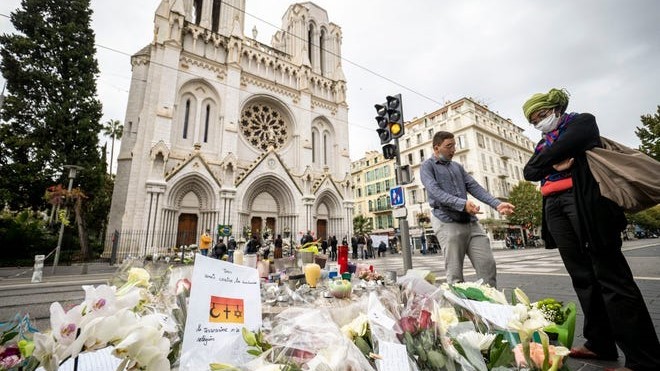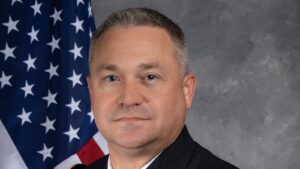
Photo: People stand in front of Notre Dame Basilica on Nov. 1, 2020 in Nice, France. (Courtesy: Arnold Jerocki, Getty Images)
As seen in USA Today, by Kim Hjelmgaard
Note: Muhammad Fraser-Rahim, Ph.D., is an assistant professor in The Citadel Department of Intelligence and Security Studies
After two brushes with terrorism, Paul Moreira’s Paris-based TV production company is seeking a new home.
“It’s time for us to move,” said Moreira, 58, an investigative journalist and documentarian who has reported from some of the world’s most dangerous conflict zones. He spoke to USA TODAY on the day France saw its third terrorist attack since September, when a trial began for alleged accomplices in the 2015 Charlie Hebdo killings.
Five years ago, the satirical magazine Charlie Hebdo published cartoons depicting the Prophet Muhammad, which many Muslims find offensive. In January 2015, two brothers murdered 12 people at their office in Paris, shouting that they had “avenged the prophet.”
Moreira’s firm Premières Lignes occupies the space across the hall from Charlie Hebdo’s former offices. Moreira’s employees were among the first witnesses of the attack.
Moreira and his employees were not caught up in the latest assault, a gruesome knife attack at a church in the southern French city of Nice on Oct. 29 that killed three people — or the attack two weeks earlier when a middle school teacher in a northern Paris suburb was beheaded by a Chechen man after he had shown his students Charlie Hebdo’s cartoons as part of discussion about secularism, freedom of speech and religious identity.
But two of Moreira’s staff were seriously wounded on Sept. 25 when a knife-wielding assailant targeted two random bystanders in front of the building that previously housed Charlie Hebdo’s offices. Zaher Hassan Mahmood, 25, has admitted to prosecutors that he wanted to set the building on fire, believing that Charlie Hebdo still operated there. Since 2015, the magazine has been run from a secret location. In a video found on his phone, according to prosecutors, Mahmood is seen railing against the cartoons and denouncing their publication with such intensity that he weeps profusely.
“This is a bad moment for France,” said Moreira, explaining that to stay in the former Hebdo building had become too traumatizing.
France against ‘separatism’
The three recent assaults, described by France’s President Emmanuel Macron as “Islamist terror attacks,” have reignited long-simmering tensions in a country where secular values are deeply held and proclaimed. They come also as Macron has sought to crack down on extremism in France following a spate of terrorist attacks in recent years that have, according to Macron, partially resulted from a “counter society” that seeks “Islamist separatism” at odds with France’s republican values.
Muslims are a relatively small minority in Europe, comprising roughly 5% of the population, according to the most recent estimates by the Pew Research Center, a Washington, D.C.-based “fact tank.” In France, the Muslim share of the population is the region’s highest, at around 9%. Pew estimates the U.S. Muslim population at 1%.
Although Islamic extremism gets disproportionate attention, in the United States right-wing extremists were responsible for more than 76% of terrorist attacks and plots in the U.S. in 2019 and 90% in the first half of 2020, according to a report from the Center for Strategic and International Studies, a Washington, D.C.-based think tank.
Macron has outlined a series of measures aimed at quashing religious “separatism” and freeing France from what he has described as radical “foreign influences.” These include:
- money for programs that combat extremism and address social problems in poor neighborhoods
- additional scrutiny of religious schools
- near-total ban on home schooling
- restrictions on foreign imams traveling to France to work
- far tighter regulations for mosques, including a requirement that imams are officially trained and certified in France
- Islamic organizations receiving government funds need to sign a “secular charter” that accepts French principles of free expression, tolerance and other aspects associated with secular democracy
On Thursday, Macron announced that he was more than doubling the number of soldiers deployed in the country to protect against attacks, sending 7,000 to guard schools and religious sites. He has also staunchly defended Charlie Hebdo’s right to publish the caricatures, leading to protests in several Muslim countries and sending relations between Turkey and France to a new low after Turkey’s President Recep Tayyip Erdoğan last week accused Macron of Islamophobia over the caricatures and even questioned his mental health. Paris has since recalled its ambassador to Turkey in protest, and Erdoğan has called on Muslim countries to boycotts French goods.
Yet while many Muslims on religious grounds consider any depiction of the prophet as offensive, the issue in the context of France is nothing if not thorny, experts say.
Yet while many Muslims on religious grounds consider any depiction of the prophet as offensive, the issue in the context of France is nothing if not thorny, experts say.
“They are the equivalent of the N-word. They are equivalent of blackface. They are racial slurs,” she said. The cartoons, Mogahed added, “target a vulnerable, marginalized, disempowered and demonized community by a powerful institution, who are then further demonized, sometimes by the state, for protesting those slurs.”
Mogahed said believing the cartoons are offensive should not in any way be understood as justification for any form of violence, and indeed governments and Muslim leaders and organizations across France and the world have condemned the attacks.
However, she said it it was “a myth” and “completely disingenuous” of France to project the idea that “it is all open and anyone can say anything they want to anyone.” She noted, for example, that Holocaust denial is criminalized in France and that wearing the Muslim headscarf known as a hijab, a practice some Muslims view as a form of self-expression, is banned in French schools, while burqas, niqabs and other full-face coverings are prohibited in all public spaces. Transgressors are subject to fines.
Free expression is “not being applied consistently” in France she said, adding that in his support for the cartoons to be published Macron is effectively “imposing a different kind of state religion” that she referred to as as “French Republic nationalism.”
Muhammad Fraser-Rahim, an executive director for North America at Quilliam, a London-based think tank that focuses on countering extremism, said “Muslim circles” in France, Belgium and other Western European nations have been slow to recognize the need for a far more public and rigorous debate about how it’s possible to be “both French and Muslim.”
He said there’s no question that Muslims in France are discriminated against and that mental health and societal factors, such as few economic opportunities, are often downplayed or overlooked when trying to understand how radicalization happens.
But Fraser-Rahim — a historian of Islam who spent more than a decade as a counterterrorism adviser, including at the Department for Homeland Security — added that corrosive, “narrow theological interpretations” of Islam, often imported from abroad, have played a major role in “wreaking havoc in communities” where young Muslims are being exposed to “fringe and austere” versions of the religion that bear little resemblance to the mainstream.
“It’s mental health. It’s being on the margins. It’s unemployment. But it’s also about how people are reading and interpreting scripture and relating to it,” he said.
Fraser-Rahim noted it was “absolutely despicable” that Malaysia’s former leader Mahathir Mohamad said in a blog post circulated on social media directly after the recent Nice attack that Muslims had “a right to be angry and kill millions of French people for the massacres of the past.” Mohamad later claimed his words were “misrepresented” and he clarified that while he did not approve of the attack, freedom of expression does not include “insulting other people,” referring to the cartoons.

 Citadel professor published in the Smithsonian Magazine
Citadel professor published in the Smithsonian Magazine Citadel dean named to South Carolina Humanities board of directors
Citadel dean named to South Carolina Humanities board of directors Employee of The Citadel DoD Cyber Institute selected to be deputy commanding general of U.S. Army’s Cyber Center of Excellence
Employee of The Citadel DoD Cyber Institute selected to be deputy commanding general of U.S. Army’s Cyber Center of Excellence

